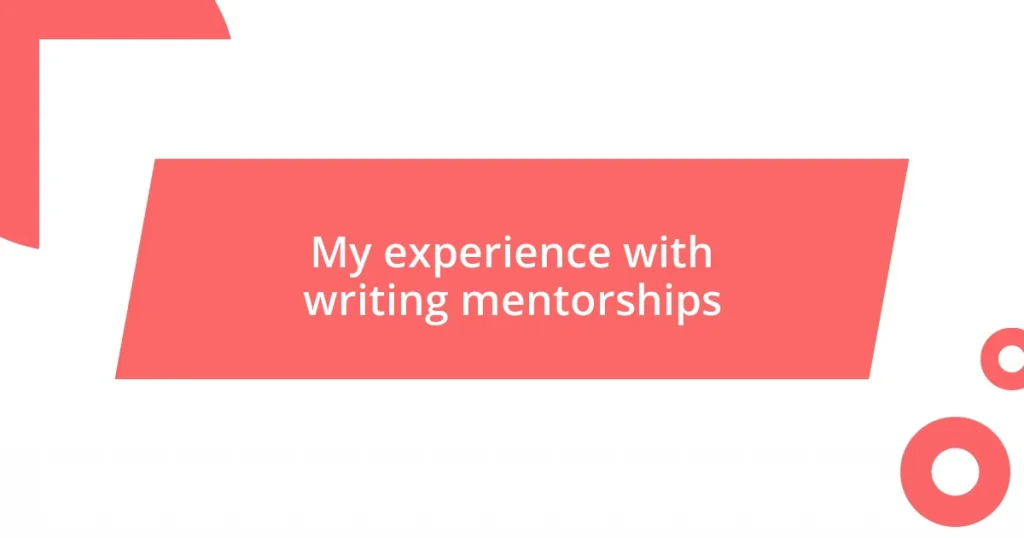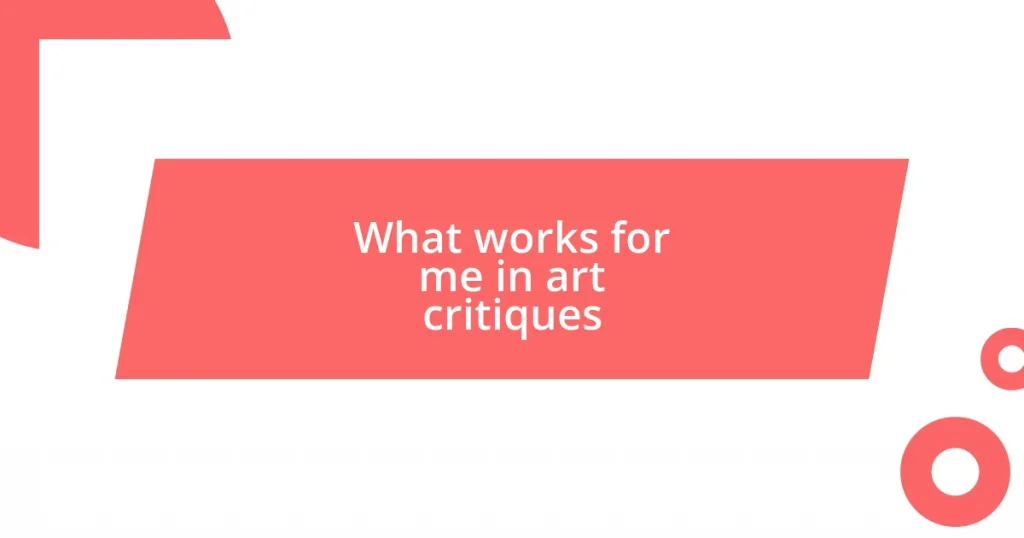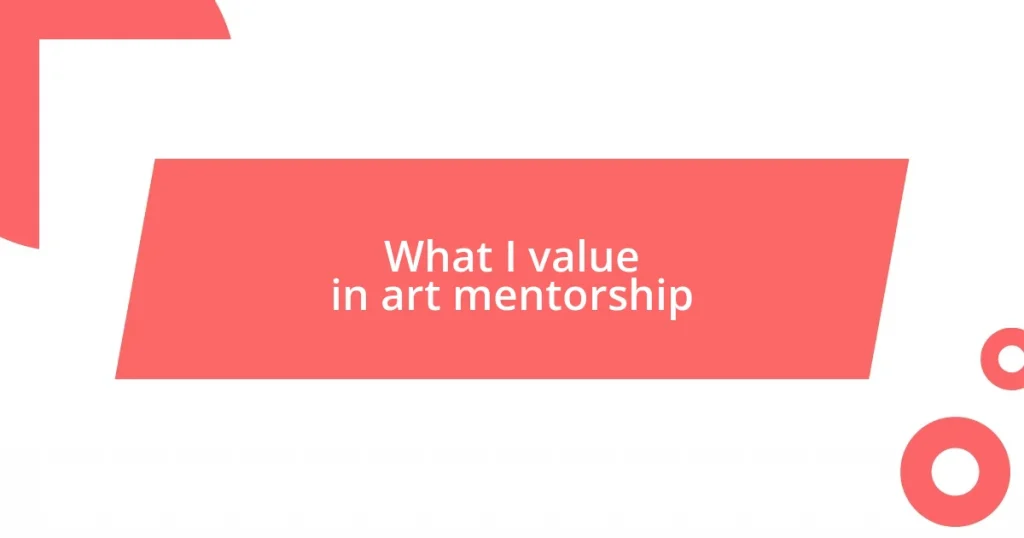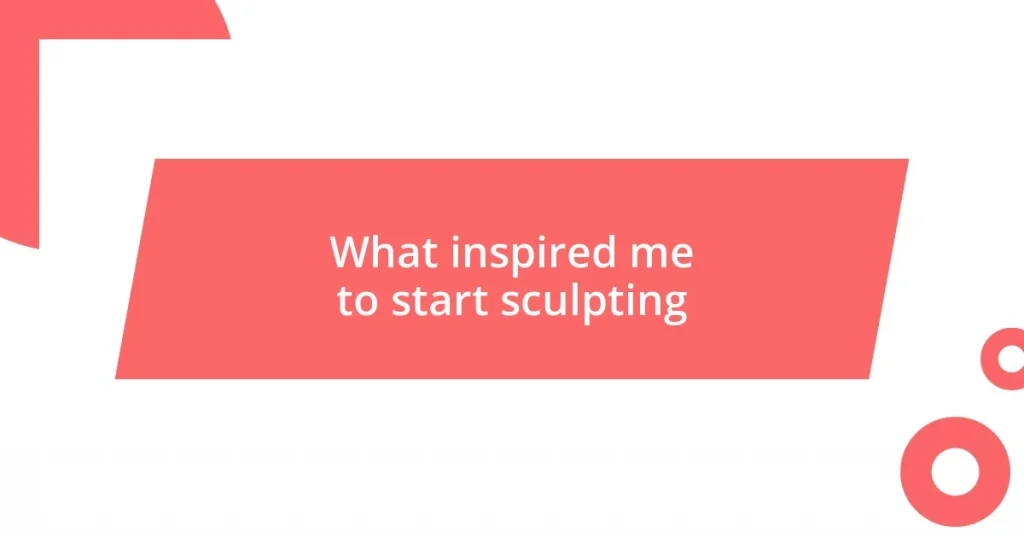Key takeaways:
- Writing mentorships provide invaluable personalized guidance, emotional support, and accountability, helping writers overcome challenges and grow in their craft.
- Finding the right mentor involves aligning goals, researching potential mentors, and establishing a comfortable connection to foster effective communication.
- Embracing feedback as a tool for growth and reflecting on mentorship experiences lead to enhanced writing skills and personal development.
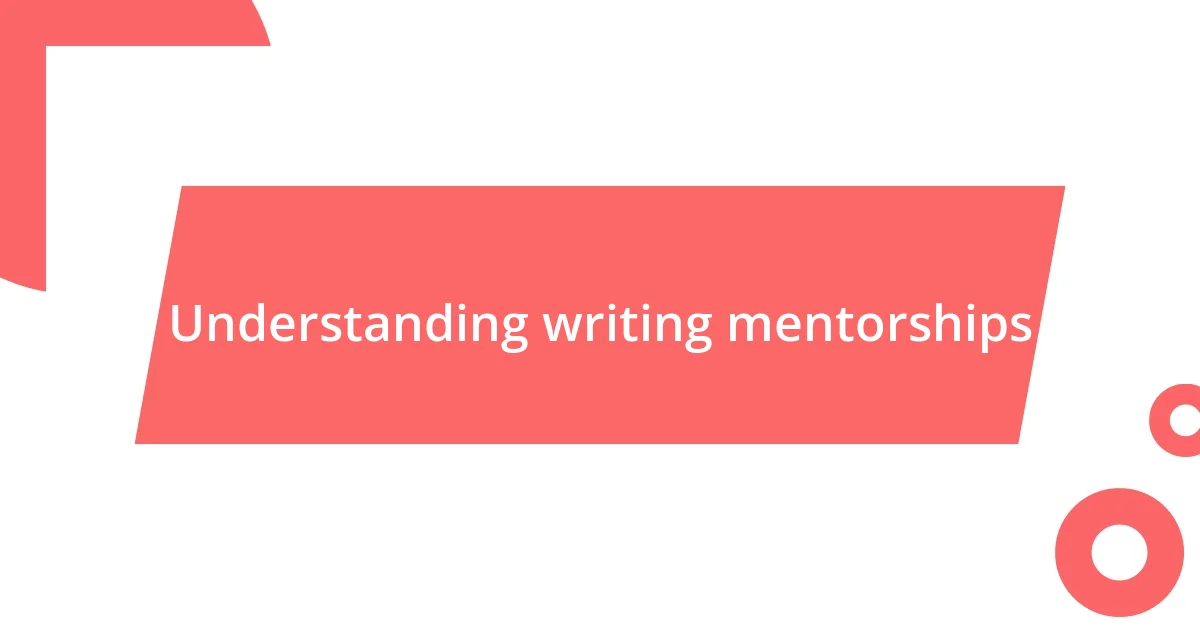
Understanding writing mentorships
Writing mentorships provide a unique opportunity for writers at all levels to refine their craft. When I first sought mentorship, I felt a mix of excitement and fear—would I be vulnerable enough to share my work and truly absorb feedback? That moment of uncertainty is universal; many writers wonder if they’re ready to take that leap.
The beauty of these relationships lies in the guidance and support a mentor offers. I vividly remember a particular session where my mentor pointed out the emotional resonance in a character I wrote. It made me realize how crucial it is to inject authenticity into my writing. Have you ever experienced this breakthrough moment? It’s incredibly empowering to see your work through someone else’s eyes.
Moreover, mentorships can spark growth beyond just writing skills. They’ve expanded my perspectives on storytelling and encouraged my exploration into new genres. I often reflect on how mentorship has shaped my writing journey—have you considered how a mentor could potentially transform yours? Embracing this collaborative approach has made my writing more vibrant and connected.
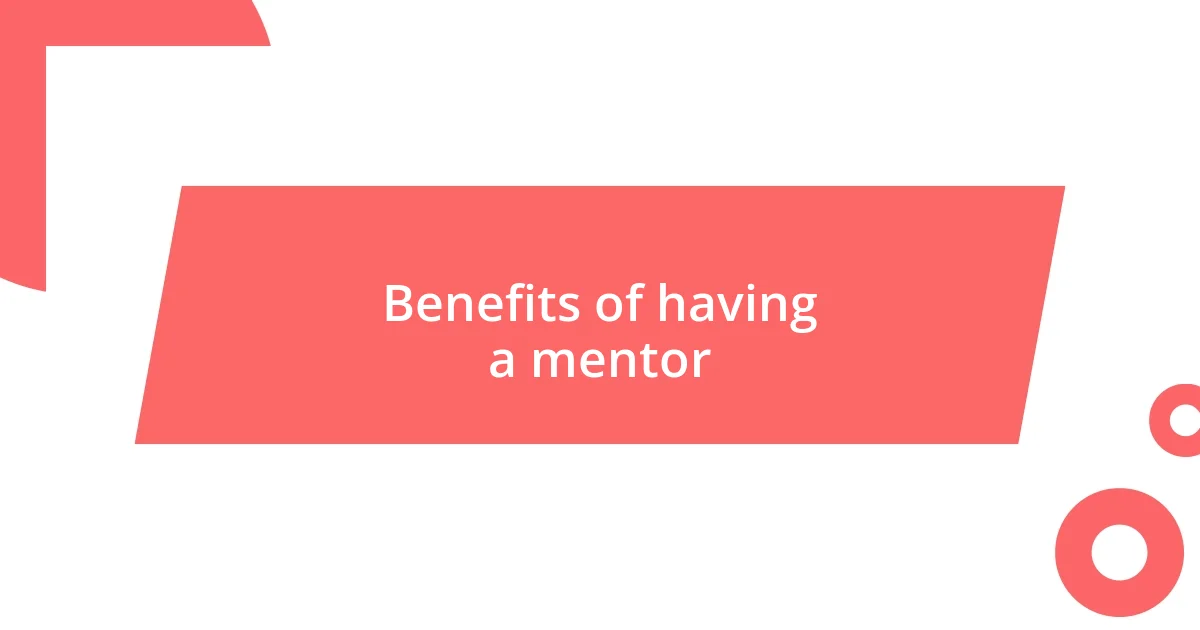
Benefits of having a mentor
Having a mentor can significantly enhance your writing experience. I remember feeling particularly lost while working on my first novel draft. My mentor helped me break down the narrative structure, making it manageable and less daunting. This kind of personalized guidance can often illuminate paths that seem completely hidden when you’re working solo.
Additionally, the accountability that mentorship provides is invaluable. I can’t tell you how many times my mentor nudged me to submit my work for publication. That push was exactly what I needed to step out of my comfort zone. It’s a gentle reminder that it’s always worthwhile to take the leap, and having someone believe in you can be a powerful motivator.
Lastly, the emotional support of a mentor is a game-changer. Writing can be an isolating journey filled with self-doubt. In moments when I felt particularly vulnerable, my mentor’s words of encouragement reignited my passion to create. It’s comforting to know that someone is cheering for you, and that emotional connection can fuel your creativity in ways you might not expect.
| Benefit | Description |
|---|---|
| Personalized Guidance | Mentors provide tailored advice, helping you navigate specific challenges in your writing. |
| Accountability | A mentor keeps you on track with your goals, encouraging you to take the necessary steps to advance your writing. |
| Emotional Support | Having a mentor offers reassurance and motivation, helping to combat feelings of isolation and self-doubt. |
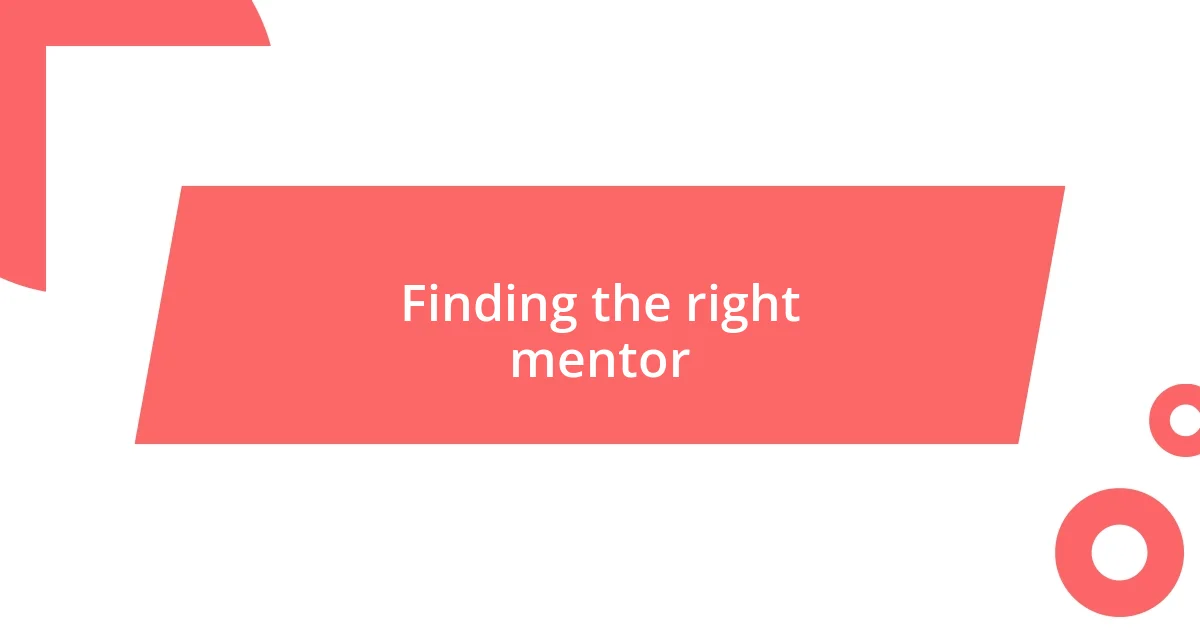
Finding the right mentor
Finding the right mentor can be a transformative experience. When searching for someone to guide me, I took time to reflect on what I truly needed. I remember feeling drawn to mentors whose writing styles resonated with me and whose values aligned with my own. The compatibility in these key areas made it easier for me to open up and accept constructive feedback without feeling judged.
To streamline your search for the perfect mentor, consider these tips:
- Identify Your Goals: Clarify what you want to achieve through mentorship—this helps in finding someone who specializes in those areas.
- Research Potential Mentors: Read their work to gauge if their style aligns with your aspirations.
- Reach Out: Don’t hesitate to contact potential mentors. A respectful, genuine message can begin a connection.
- Ask About Their Mentorship Style: Understanding how they approach mentorship can save you from mismatched expectations.
- Trust Your Instincts: Ultimately, it’s essential to feel comfortable and safe in sharing your work with them.
The journey to finding the right mentor can feel overwhelming at times, but I assure you, the effort is worthwhile. I remember a moment when I hesitated to approach a writer I admired. However, the genuine warmth and enthusiasm I sensed from them made all the difference. That first conversation left me feeling inspired and validated, reinforcing the importance of taking that courageous step.
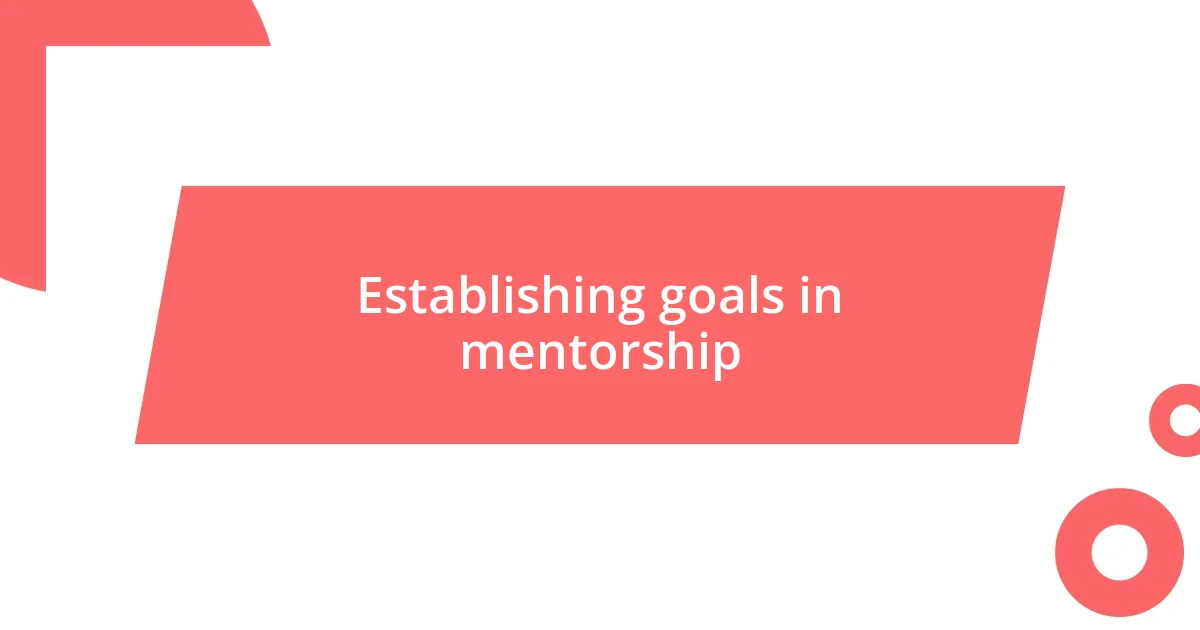
Establishing goals in mentorship
Establishing clear goals in mentorship is key to maximizing the relationship. When I embarked on my writing mentorship journey, I set specific objectives, like improving my dialogue and plot development. This clarity not only guided my sessions but also helped my mentor tailor their advice perfectly to my evolving needs.
It’s fascinating how, without well-defined goals, mentorship can lose direction. I recall a time when I entered a session without a clear focus, and while we enjoyed the conversation, I walked away feeling unfulfilled. It made me realize that intentionality is crucial. What do you want to accomplish? Have you taken the time to map it out? Those questions can shape the mentorship experience significantly.
Regularly revisiting these goals can also provide a sense of progress. I started keeping a journal where I noted my advancements, shifts in focus, and even moments of encouragement from my mentor. Looking back at those entries, I often felt a surge of pride—proof that goal-setting paves the way toward tangible achievements. Whether it’s refining your unique voice or tackling a challenging genre, those milestones matter.
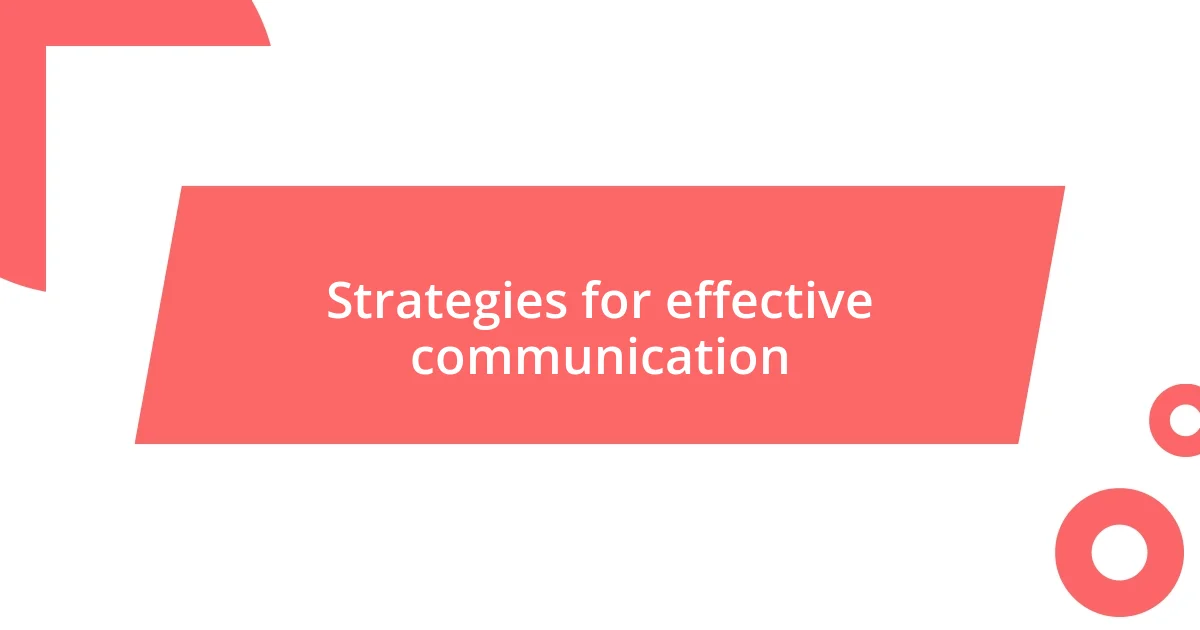
Strategies for effective communication
Effective communication in a mentorship is pivotal, and one strategy I’ve found invaluable is active listening. When my mentor shared insights, I made a conscious effort to absorb every word. I learned to pause, reflect, and ask clarifying questions. This not only deepened my understanding but also demonstrated my engagement. Have you noticed how connection strengthens when you truly listen? It’s like building a bridge between minds, and in my experience, it has helped foster trust and openness.
Another crucial aspect is to be clear and concise when expressing your thoughts and questions. I remember a time when I rambled during a session, trying to articulate my struggles with character development. As I saw my mentor’s confused expression, I realized the importance of clarity. Sometimes, honing in on just one specific issue can lead to more fruitful discussions. It’s all about stimulating meaningful dialogue. How can you expect to derive the most value if your message gets lost in a sea of words?
Lastly, vulnerability can be a powerful tool in communication. I once hesitated to share my fears about my writing not being good enough. But when I finally did, it opened the floodgates for honest conversations. My mentor was able to share their own struggles, creating a safe space for growth. This experience taught me that showing our true selves can lead to deeper connections. Have you ever felt that sense of relief when someone else echoes your insecurities? That shared vulnerability often cultivates an atmosphere ripe for learning.
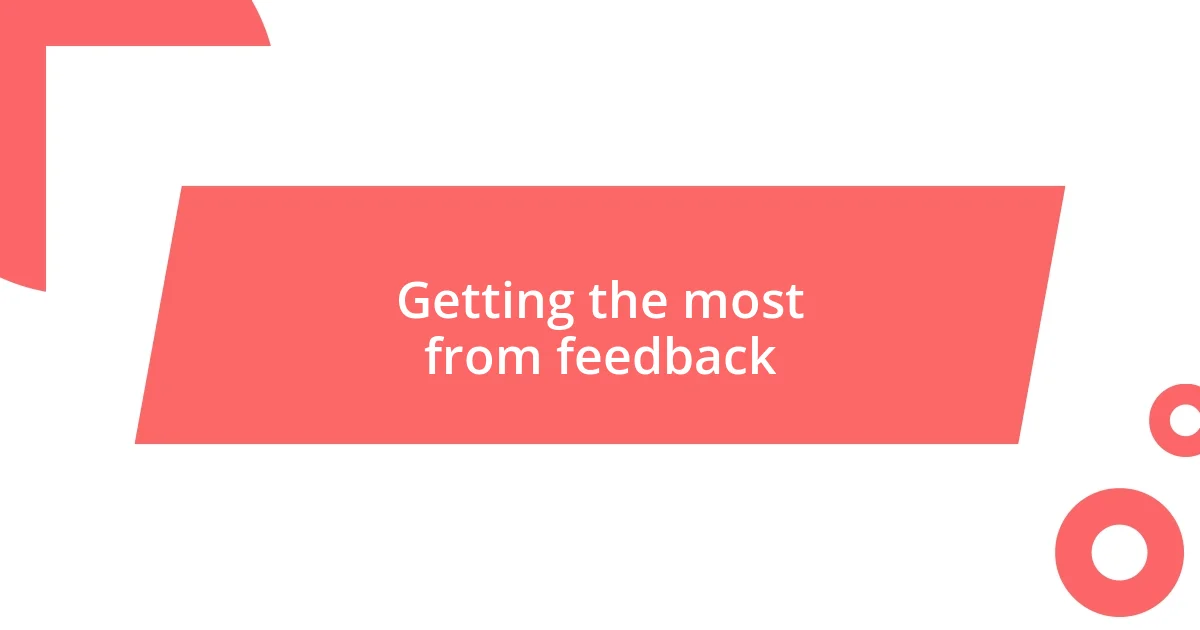
Getting the most from feedback
Receiving feedback can feel daunting, but I’ve learned to approach it as an opportunity for growth. During one of my sessions, I received some critical comments about my pacing. Initially, I felt defensive, but then I took a step back and asked myself: what can I learn from this? Embracing feedback as a tool rather than a judgment can shift your entire mindset, allowing you to absorb and apply what resonates.
To truly get the most from feedback, I found it helpful to ask specific questions. After a critique on a story draft, instead of simply saying, “What do you think?”, I began asking, “Which parts of the plot felt confusing to you?” This targeted approach not only clarified my mentor’s thoughts but also opened up deeper discussions. Have you ever noticed how pinpointing a concern can transform a vague opinion into actionable advice? It’s an approach I’ll always advocate for in any mentorship.
Incorporating feedback into my writing became another essential step. I remember a particular piece where my mentor suggested a significant overhaul. Instead of seeing it as a setback, I approached it with excitement, treating it like a creative puzzle. That shift in perspective made all the difference in how I integrated their insights. When was the last time you turned criticism into an avenue for innovation in your work? Embracing that challenge can elevate your writing in ways you might not anticipate.
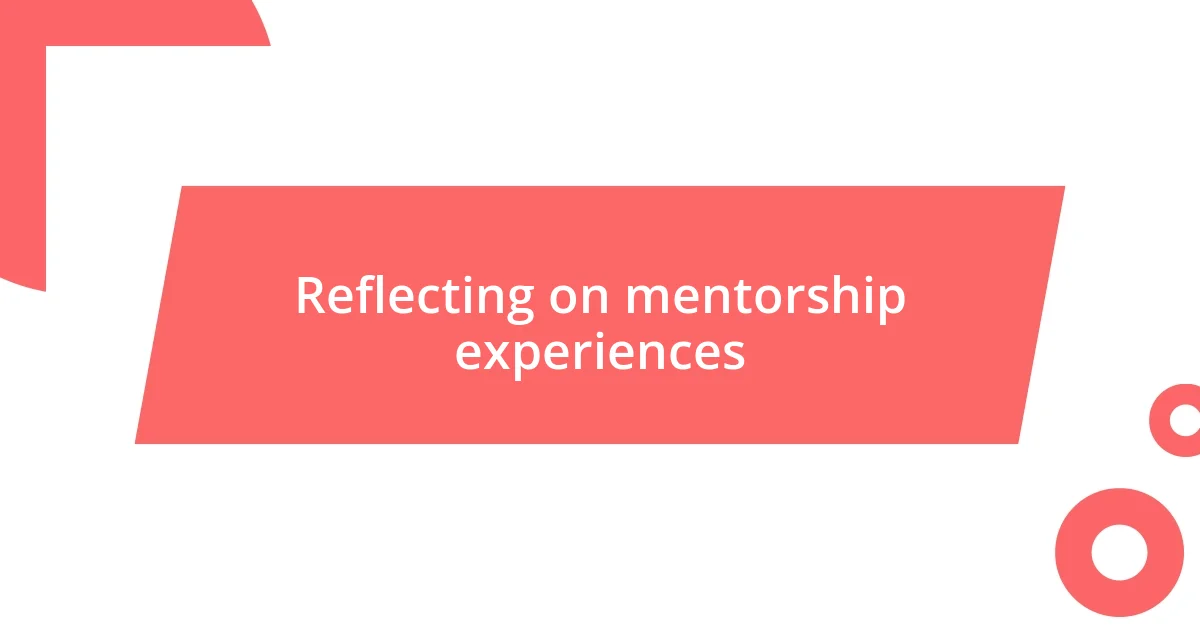
Reflecting on mentorship experiences
Reflecting on mentorship experiences brings to mind a moment when I felt truly empowered. I vividly recall a session where my mentor encouraged me to explore new genres. I hesitated at first, worried about stepping outside my comfort zone. Yet, that simple nudge transformed my perception of what I could create. Isn’t it refreshing how a single conversation can broaden your horizons?
I also think about the emotional rollercoaster that often accompanies mentorship. There were days when I felt jubilant after receiving praise, and others when doubt clouded my confidence. I remember one particularly tough session where my mentor pointed out repeated weaknesses in my character development. At first, it stung, but later, I appreciated that honesty. It’s fascinating how enduring those uncomfortable moments can build resilience and ultimately sharpen our craft.
Looking back, I see that mentorship wasn’t just about honing my writing skills; it was about self-discovery. With each feedback session, I learned things about my passions, values, and even fears. Like the time I uncovered my aversion to vulnerability within my storytelling. It led me to rethink my writing approach and embrace authenticity. Don’t you find it remarkable how mentorship can instigate such profound personal growth?










